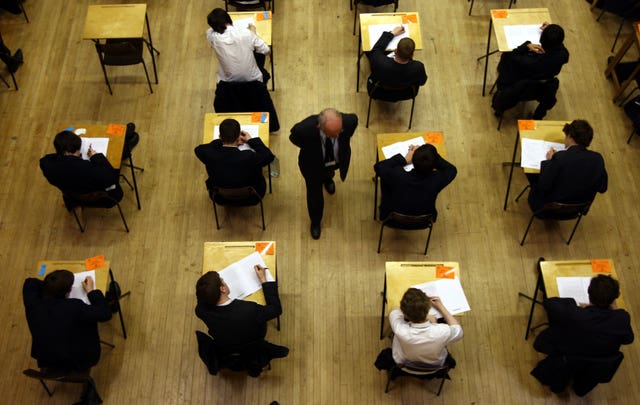
THE North-East and Yorkshire and the Humber has seen some of the lowest school attendance rates in the country, bringing fresh concerns over the education gap between the north and south.
Think tank Northern Powerhouse Partnership says pupils in the north of England will be at a disadvantage if the Government presses ahead with plans for exams next summer.
Figures show secondary school attendance rates in some local authorities in the north have been as low as 61 per cent as coronavirus infection rates in the areas have risen.
Covid: 1,227 new cases in North East and North Yorkshire since yesterday
On 15 October, secondary schools in the South West had the highest rate of attendance with 90 per cent of pupils in school.
The North West and Yorkshire and the Humber had the joint lowest attendance rate at 81 per cent, followed by the North East at 83 per cent.
Middlesbrough's rate was 75 per cent, Stockton-on-Tees rate is 77 per cent, Sunderland's rate is 78 per cent and Newcastle's rate is 79 per cent.

Three regions - the east of England, the South East and South West - topped the data with 95 per cent attendance, while the North West saw the lowest rate at 87 per cent.
The Northern Powerhouse Partnership has called for coursework to be used to assess GCSE and A-Level students instead of exams.
Head of policy for the partnership Sarah Mulholland said: “We are very concerned that students across the north are at a disadvantage if the Department for Education opts to go ahead with GCSE and A-Level exams next summer.
 Pupils taking an exam (David Jones/PA)
Pupils taking an exam (David Jones/PA)
“Northern students are the ones currently being impacted negatively by high infection rates and self-isolation.
“Currently, the north has some local authorities with attendance rates for secondary schools as low as 61 per cent whereas a number of southern local authorities are close to the usual national average of 95 per cent.
“We appreciate the Government’s desire to try and keep things as normal as possible but this is now not possible in many northern communities.
“We urge the Government to commit to continuous assessment as it is a fairer alternative to the proposed examination plan.
“It would also reduce the risk of a similar fiasco such as we saw this summer.
“Assessing children this way, if it is planned in advance, may in fact be more rigorous than what is proposed if plans were to have to change at short notice.”
The Government has said exams will go ahead in 2021 but will be held three weeks later than usual.
Schools North East, which is a network of headteachers in the region, previously said the Government's decision to press ahead with exams was a "disappointment".
A spokesperson said at the time: "While the proposed delay to the exam timetable will add extra teaching time, three weeks is simply not enough to address the disruption children and young people have already faced as a result of the coronavirus, and with further local outbreaks this disruption is set to continue.
"We called on the Government to make significant modifications to both GCSEs and A levels, to ensure a fair and consistent system of exams which would allow schools to address both educational and emotional catch-up.
"As well as going further to address the disadvantage gap, these changes would also bring England more into line with Scotland, where the National 5 exams (GCSE equivalents) have been suspended. Unfortunately, the adaptations confirmed by the DfE simply do not address these concerns.
"They fail to take into account the variety of remote learning experiences resulting from different levels of access to online resources and family support.
"The Government has not acted quickly enough, and it is worrying that the process for making a decision on contingency plans is only just now beginning."

In Knowsley, which is subject to the Tier 3 restrictions as part of Liverpool City Region, there was 61 per cent attendance for pupils in secondary schools which responded.
The figures, which were placed in the House of Commons library following a written question from Wirral West MP Margaret Greenwood, showed the North West and Yorkshire and Humber were the regions with the lowest attendance in their secondary schools, at 81 per cent.
The South West had the highest rate of pupil attendance at 90 per cent.
A Department for Education spokeswoman said: “Exams are the fairest way of judging a student’s performance, which is why they will go ahead next year, underpinned by contingency measures developed in partnership with the sector.
“Over the coming weeks we will jointly identify any risks to exams and the measures needed to address potential disruption, with fairness for students continuing to be our priority.”
The spokeswoman said schools were expected to provide pupils with remote education when they were self-isolating and headteachers could decide how to use their school’s premium allocation funding to tackle the impact of lost teaching time on pupils.
Have you kept a child off school since Covid?
If you've kept your child of school during the pandemic, let us know why. Have they been sick? Did someone in their class test positive? Are you worried about sending them to school? Leave your name and number alongside your experience and we may be in touch.



Comments: Our rules
We want our comments to be a lively and valuable part of our community - a place where readers can debate and engage with the most important local issues. The ability to comment on our stories is a privilege, not a right, however, and that privilege may be withdrawn if it is abused or misused.
Please report any comments that break our rules.
Read the rules here